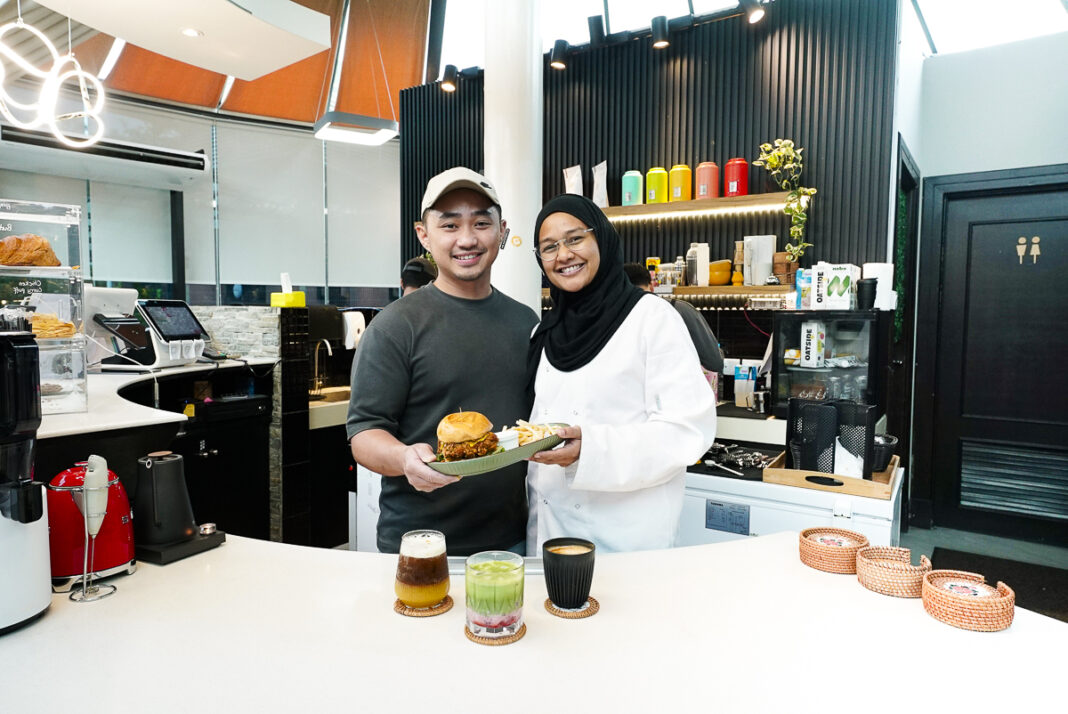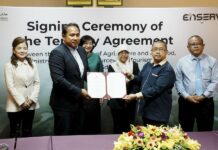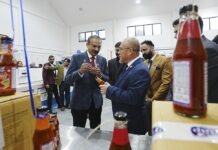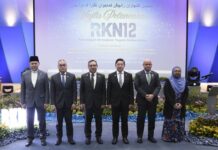The entrepreneurial pursuits of Bruneian youth in restaurants and cafés are not new — but surviving for nearly a decade in a space where everyone competes for the same pool of customers, against legacy businesses and international franchises, is a noteworthy achievement.
Since 2017, the husband-and-wife duo behind Star Anise have been amongst the few to do so on their own, traversing the F&B space by reinventing themselves across different menus and brands: from nasi campur to popcorn chicken to flavoured coffee — all to keep their fledgling operations afloat.
Now nestled against the scenic backdrop of UBD’s Botanical Garden, Star Anise’s latest iteration, Coffee Up, has found a new home.
“We have one honeypot — we don’t work anywhere else. This is what we do full-time. So, all in,” says Nurafilabibah Mohd Shafiee.
“Sometimes people criticize — (saying) why can’t you sustain (all your brands)? But sustaining a brand isn’t the most important thing. Sustaining yourself in the industry is what’s important.
“Because business isn’t just about generating money — it’s about developing yourself as a person.”
Selling but not earning
Labibah’s entrepreneurial journey with her husband Abd Azim Rabbani Hj Abd Rajak began earnestly by supplying packed food to UTB’s canteen while they were both still students.
Labibah was completing her degree at UBD, while Azim was enrolled at UTB.
Behind the stove was Labibah’s mother, Satrani — herself taught by her mother, who once ran a small eatery in Belait.
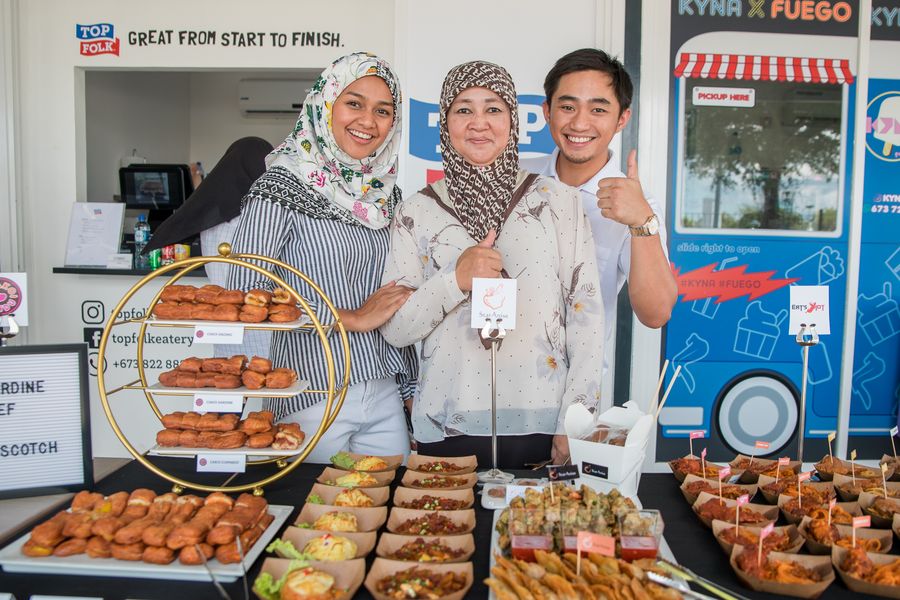
Their menu brought together Malay, Chinese and Indian influences, bearing many similarities with Nyonya cuisine.
Their nasi campur and packed meals would sell out daily — and not long after, they were invited to operate at the canteen for several months.
But after the cost of ingredients, wages, and other expenses were accounted for, there was little left on the table.
“We were making sales but not profits,” said Labibah. “Our margins weren’t right. There was no system for the workflow or documentation for costs and expenses. Costing, pricing, planning — it was agak-agak (estimated).”
If it wasn’t the recipes that needed fixing, but solid business fundamentals — and more hands-on experience running their own outlet — then their next stop made sense: an all-in-one incubation programme built to support their next stage of development.
Building the Star Anise brand
Since 2017, Kontena Park (KP) has served as an F&B incubator, managed by the Brunei Economic Development Board’s (BEDB) Enterprise Development arm, DARe.
In simpler terms, it’s not just a physical space to sell, but a comprehensive development programme that provides training and support for small businesses to establish their own homegrown brands.
Star Anise was part of the first batch of vendors to open at KP after its refurbishment in 2019.
“Our time at KP was essential. It’s where we began hiring our first staff; setting up workflows and processes, both in the kitchen and for our business. It’s where we really began building the Star Anise brand,” said Labibah.
By the end of their 12-month tenancy, Star Anise had become a staple for staff working in the surrounding Anggerek Desa Technology Park, who looked forward to their daily rotation of nasi campur, and their signature laksa.
The learning curve was still steep when they left. The leap to owning a full storefront brought significant costs that the young couple were unable to take on.
“We were considering moving to a food court rather than having a full restaurant setup, but even (for food courts) rentals were $1,000 to $2,000, not including kitchen and renovation costs,” said Azim.
“That’s when we saw the opportunity to run a kiosk at the Yayasan Food Street as the next suitable move.”
Strategically located in between Yayasan’s two shopping blocks, the food street guaranteed foot traffic from the capital. The space was smaller than KP’s, and the high volume of on-the-go customers called for them to deploy a different concept.
“By that time, people knew Star Anise as nasi campur. So we pivoted with another idea to sell chicken bites (popcorn chicken) in small takeout boxes — but kept our sauces from the main dishes as toppings. That became our unique selling point with Roostar Hot Chicken,” said Labibah.
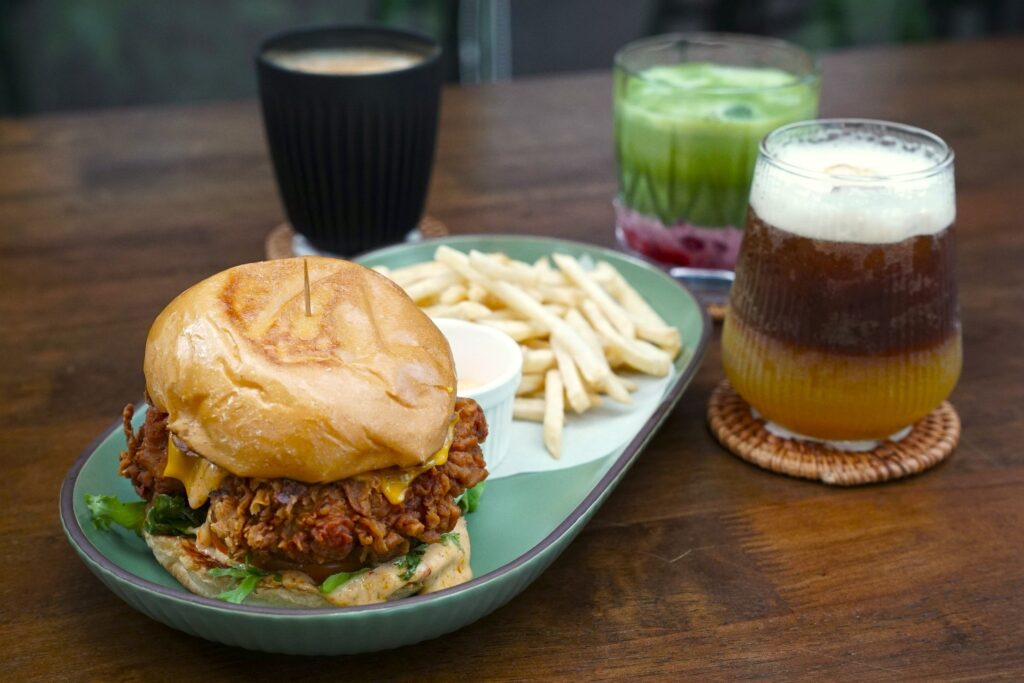
Adapting through uncertainty
In July 2021, the longtime couple tied the knot.
Two months later, the second wave of the COVID-19 pandemic arrived and eateries were forced to close.
Without the foot traffic, the business struggled to stay afloat.
“Times like that, you begin to question yourself. You ask; why is this happening? Where did I go wrong?” said Labibah.
Her grandmother, who weathered her own ups and downs as a self-employed entrepreneur, offered steadying advice that kept the couple grounded as they pushed their business through delivery platforms like GoMamam and Ta-Pow!.
“We were getting really frustrated and worried because we didn’t know how long (the pandemic) would last,” said Labibah. “She told us: It’s okay — just do your best. Have faith. That everything has been written, and you — in your role — is to just give your best. God will take care of the rest.”
As restrictions eased at the start of 2022, Star Anise saw a resurgence, buoyed by rising in-country spending as Brunei’s borders remained closed for non-essential travel until August that year.
But the couple didn’t go back to business as usual. Azim noticed the rise in specialty and third-wave coffee, with cafes blossoming across the country.
“When we noticed the rise of the coffee culture in Brunei, we realized there was still a gap for more flavoured or fun coffee drinks, which is how we started developing our own brand Coffee Up,” said Azim.
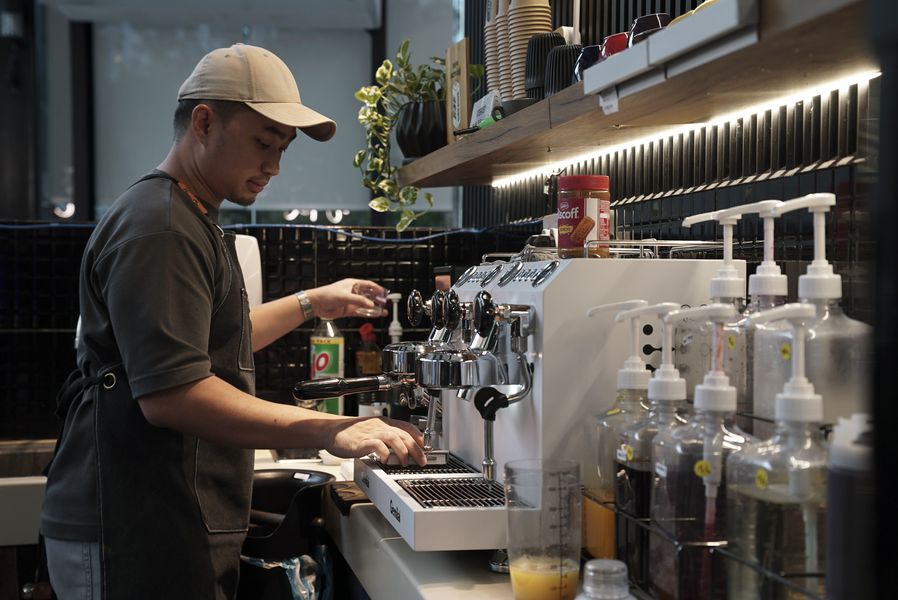
Leveraging ecosystems to bounce back
By the end of 2023, the couple had debuted their Coffee Up brand at local pop-ups and begun integrating themselves more deeply into Brunei’s business ecosystem.
They joined Baiduri Enterprise Hub in Serusop after registering an MSME account with Baiduri Bank and secured a business credit card.
“Working together with Baiduri Enterprise Hub has been a game changer for us,” said Labibah.
“Having a professional space at the Enterprise Hub for meetings has made a big difference. And with the card that lets us pay for supplies upfront — even before making any sales — it’s really helped ease our cash flow.”
The burden of juggling the three brands — the original Star Anise, Roostar Hot Chicken, and now Coffee Up — was another obstacle the couple had to overcome.
Through the Baiduri MSME Empowerment Series, they met international business consultant Kevin Legg who helped them reflect on their strategic priorities and plan for a breakout year.
“We wanted to keep going, but it was starting to feel like a lot. Managing everything at once — all these brands — felt heavy,” said Labibah.
“At this point, we’ve been in the business for over five years. We needed to really ask ourselves, where are we going? What are our strengths and weaknesses? Through our one-on-one session, we were able to leave with a renewed sense of direction.”
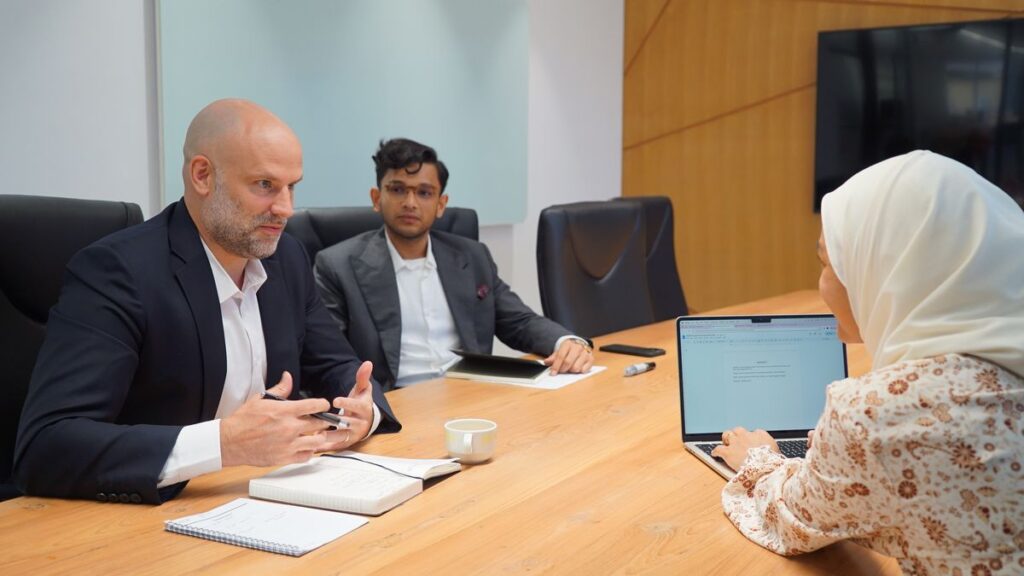
Azim also expanded his networks by joining the Brunei Malay Chamber of Commerce and Industry (DPPMB), where he met with real estate entrepreneur Dan Basrah, who shared that UBD’s Simpur Cafe, located strategically next to the Botanical Research Centre — was opening for tender.
At the turn of 2024, the milestones kept coming.
Coffee Up’s small pop-up inside iCentre that ran for three months was a resounding success, generating monthly revenue on par with their first Kontena Park stint.
They enrolled in DARe’s flagship startup development programme, Accelerate, and later graduated to Elevate — DARe’s growth consultancy programme for businesses generating over six figures annually.
Last August, they were awarded the contract to operate Simpur Café, marking their first full-fledged outlet.
It’s taken more than five years to reach that milestone — but they now have the opportunity to prove that they can hold their own in Brunei’s crowded F&B scene.
“I recall my grandma telling us during the tough times that Allah never forgets,” said Labibah.
“She reminded us: Allah is never tired of giving, until you are tired of asking.”
“If you were to count the blessings of Allah, you would never be able to count them. Looking back, even when we couldn’t sell physically, another avenue opened. And when our time at Yayasan came to an end, yet another opportunity followed.”
“Of course, we had to be ready on our part. But we can’t say it was all on our own.”
For the couple, faith remains their anchor as they navigate the trials and tribulations that often come with the entrepreneurial journey.
Forty-eight minutes into the interview, Azim — typically the more reserved of the two — offers a final reflection that sums up their philosophy.
“I’m glad to be in this line,” he said. “One of my main motivations: I’m not here to just make money. For me, personally, it’s ibadah as well.”
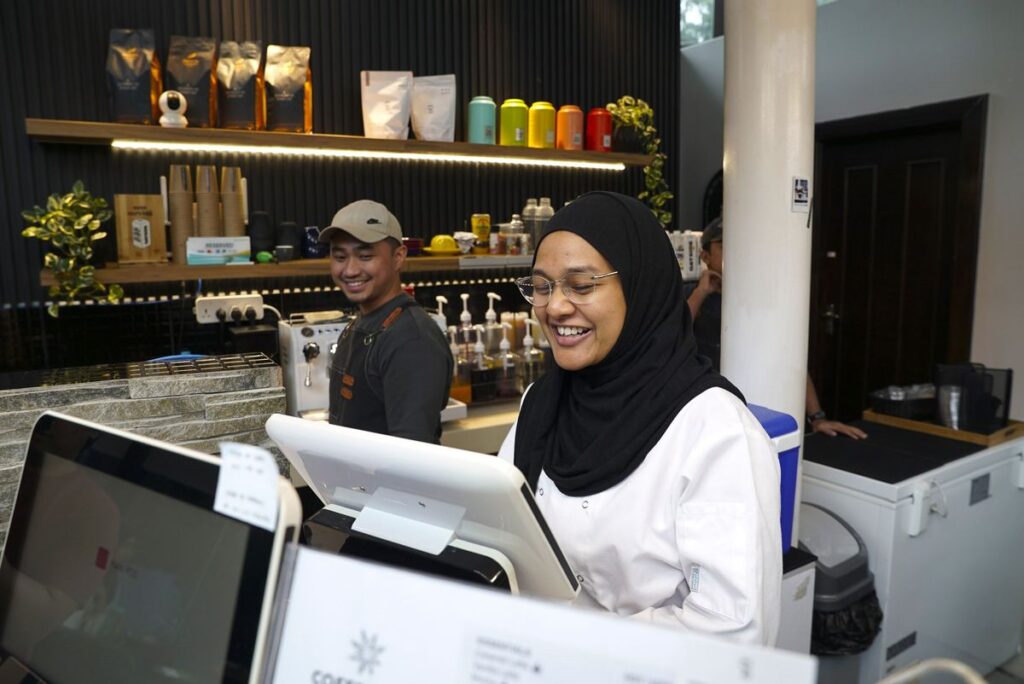

Special edition of Baiduri Bank’s Entrepreneur Spotlight in collaboration with BEDB to feature businesses supported by both organisations.


